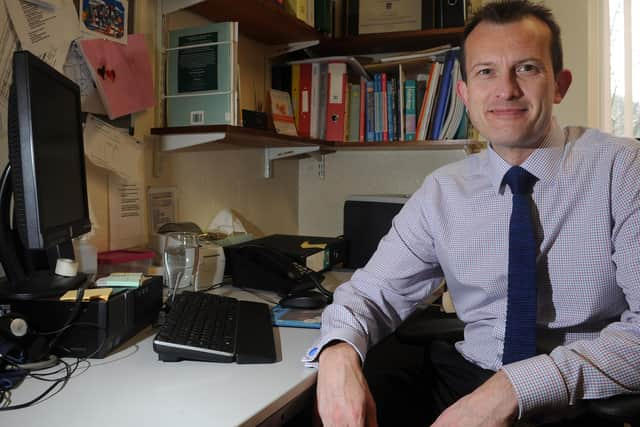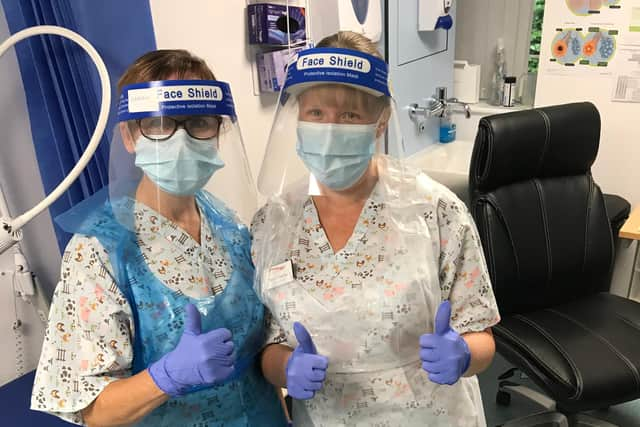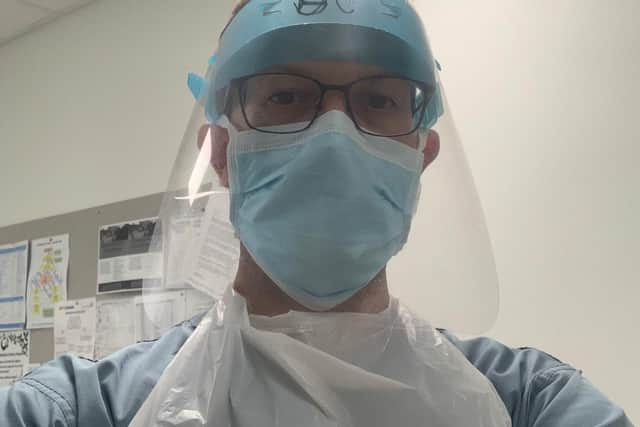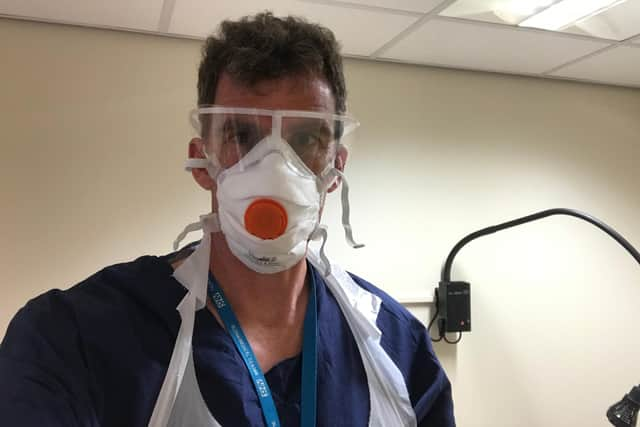How GP practices in Sheffield have kept services running during coronavirus pandemic - and why those changes may be here to stay
and live on Freeview channel 276
Amid the Covid-19 outbreak, GP practices in Sheffield have worked swiftly to adapt their daily routines and set up online assessments and consultations to continue to provide medical care for thousands in the city.
At a practice level, primary care in Sheffield has altered dramatically in the past few months with telephone and video consultations becoming normal in an effort to ensure people can get expert care and advice in a safe way while in lockdown.
Advertisement
Hide AdAdvertisement
Hide AdAnd city-wide GP practices have worked collaboratively in their response and are relying more on community organisations now, in an effort to reach those who are particularly vulnerable and may have fallen under the radar.


Dr Anthony Gore, who is the clinical director for Children, Young People and Maternity at Sheffield’s Clinical Commissioning Group and a GP at Sheffield's Woodseats Medical Centre, said one of the triumphs is how quickly GP practices in the city have been able to adapt to the new way of working.
He said: "If you think about how things were at the beginning of the Covid-19 outbreak, everybody had to suddenly adapt. We had to think about how we were going to carry on providing care while maintaining infection control.
"Practices quickly went to phone assessments to assess what people’s needs were, which from a patients point had some vast positives as the majority of patients were actually getting assessed on the day.
Advertisement
Hide AdAdvertisement
Hide Ad

"They might not have had a face-to-face assessment but often they were speaking to a doctor which was normal in lots of practices but not every practice. So, that shift to large scale phone assessment, which was normal in some places, has now become virtually universal.
"Everything that can be done without physical contact is being done by phone, with the addition of video consultations which are particularly useful if you want to see how someone is looking and also useful for things like mental health assessments, where you want to see somebody's body language, for example.”
Technology to allow doctors to assess conditions through the use of text messaging has also been rolled out to reduce the need for face-to-face appointments – allowing them to see, for example, a photo of a rash on someone’s arm which can then be followed up with a phone consultation.
“If someone actually has a real need for a physical examination – that could be something gynaecological, abdominal pain or breathing difficulties – we can then arrange for you to come to the surgery,” Dr Gore added.
Advertisement
Hide AdAdvertisement
Hide Ad

“At that point, there’s hardly anybody in the waiting room as it’s not as heavily booked, we can adhere to spacing and the clinician you see will be in PPE. It’s very different now but it’s how it has to be.”
Rachel Fletcher and Sarah Street-Rose are primary care nurses at Woodhouse Medical Centre dealing with a multitude of different areas of medicine and healthcare.
Before Covid-19, they would see patients face-to-face for everything from vaccinations and dressings to helping people manage long term illnesses like asthma and diabetes – but now they have adapted to a new reality which they say it ‘working well’.
"We’ve started doing more telephone reviews in terms of people with diabetes, asthma and COPD (chronic obstructive pulmonary disease) and that’s been working out really well,” Sarah said.
Advertisement
Hide AdAdvertisement
Hide Ad

"When you’re seeing a patient face-to-face, you see how they’re feeling. But now we’re having to rely on verbal cues and we’re getting the hang of that. With something like asthma, you can tell whether they’re struggling to breathe if they're unable to talk in full sentences and things like that.
"It's about what they’re describing to us and we rely on that. If we are concerned we do then put them in for an appointment with the GP and they follow them up via video consultation.”
Rachel said: “A lot of people are happy just to get a phone call and are happy for us to have a chat with them. On a daily basis we’ve got enough bookings for about 20 patients each. Before lockdown restrictions eased it was about 50 per cent face-to-face and 50 per cent over the phone.
"We've said as a nursing team that the telephone reviews will continue even when we're back to normal.
Advertisement
Hide AdAdvertisement
Hide Ad"We’ve managed to get hold of a lot of patients who wouldn’t attend their reviews and have managed to change treatments, pick up when people have problems and refer them to the GP, and we’ve even asked patients to do peak flow diaries and things for asthma and had them send the readings back to us.”
Despite only being set up last year, Primary Care Networks (PCNs) have also proved vital in the city’s healthcare response to the virus – helping support and organise groups of practices on a wider scale by allowing them to work collectively and share everything from staff to the services it has on offer.
Dr Ollie Hart, of Sloan Medical Centre, said: “Sheffield has got 15 primary care networks which are groups of GP practices that are working together as a team working with the community-based organisations to help create a whole health and well-being response to Covid-19 or other conditions.
"We share staff, we share ideas and share some services. For example, in response to Covid, our primary care network put together a home visiting blood service for people who are shielding. It made much more sense to do that across our nine practices rather than just one practice doing it nine times over.
Advertisement
Hide AdAdvertisement
Hide Ad"We have a nurse who goes out to people who are shielding, or those that are struggling to get in because of the pandemic – it’s about looking for solutions that are better on a slightly larger scale than in the individual GP practice.”
Practices across the city, Dr Hart says, have heavily relied on their partnerships with community organisations to help those who are finding it difficult to deal with the strains of Covid-19.
"It’s been a very different time for us,” he added. “Clearly the way we normally practice, by seeing people face-to-face, often being quite proactive by taking tests, and trying to keep people healthy rather than just responding to when they’re unwell, has been really disrupted.
"We’ve not been able to see people as we would like, we’ve not been able to do the blood tests that we would normally do, so it has been a really difficult time in how we help people to look after themselves.
Advertisement
Hide AdAdvertisement
Hide Ad"Personally I’ve seen some fantastic support from the community charities. We're blessed with some amazing community groups. Heeley Trust we have locally, and Manor and Castle Development Trust, Darnall Wellbeing – those sort of organisations reach into the heart of the communities.
"We’ve been relying on them quite a lot to search out people who are struggling and they highlight people that we can talk to on the phone. They’ve been supporting a huge number of people just to stay in contact and keep their head above water.”
The PCNs have also allowed GP practices to host ‘hot hubs’. These are a place to see patients with coronavirus symptoms face-to-face, in which one surgery within the network will see patients, rather than each individual surgery, helping to minimise the risk of spread of the virus in different parts of the city.
And while it has undoubtedly been an uncertain time for some, the pandemic has now led some to question the way medical services could be delivered in the future.
Advertisement
Hide AdAdvertisement
Hide AdDr Gore said: “When you think about the future, there are a few things – clearly if the virus isn’t going anywhere, and even if the level of it is low, you can’t assume someone hasn’t got it anymore because we know there are asymptomatic spreaders. So these new things we’re describing have to be universal and can’t be relaxed.
"I think a lot of phone assessment is here to stay, so both doctors, nurses, other healthcare professionals, and patients are going to have to get used to that. Going forward, because that can be very intense, I think the use of technology will start to become more important and then we'll get different forms.
“It will be to aid the actual consultations, to aid the long term conditions work. There may be the use of more remote technology but it’ll also be about how we control demand.
"There's some practice already but I think it will become more obvious to patients.”